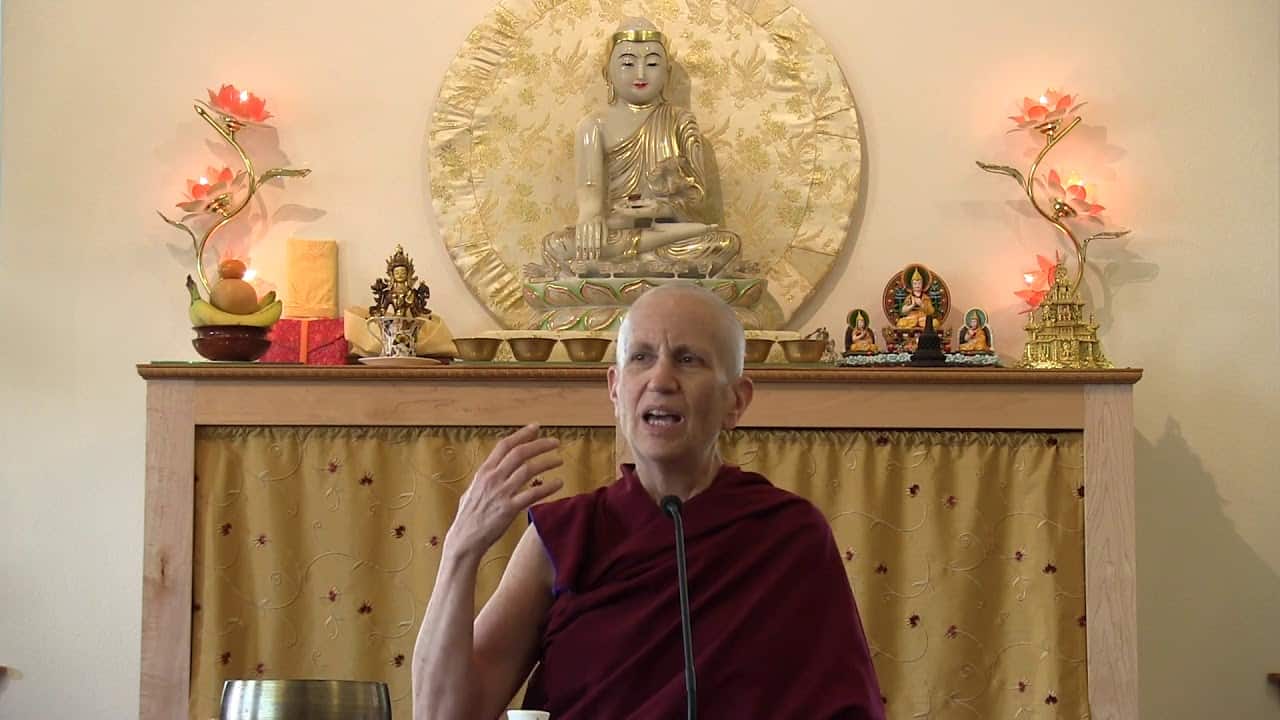Sweet and endearing mothers
Part of a series of short Bodhisattva's Breakfast Corner talks on Langri Tangpa's Eight Verses of Thought Transformation.
- Thinking about the kindness of all sentient beings
- The benefits of equalizing and exchanging self and others
- Working to benefit sentient beings long-term
In short, I will offer directly and indirectly
Every benefit and happiness to all beings, my mothers.
I will practice in secret taking upon myself
All their harmful actions and sufferings.
We talked about “my mothers,” and how important it is to have a sense of closeness with other sentient beings. We have to see them as endearing. If we don’t see them as endearing, we’re not going to be able to generate love and compassion towards them. One way to see them as endearing is to see them as our mothers, and having been kind to us as our mothers.
Another way to do that is in the equalizing and exchanging self and others tradition, and there we think of the kindness of sentient beings, not just when they were our parents, but across the board. Because everything in our lives, our whole ability to stay alive, is due to the kindness of other living beings. Whatever job they do in society, we reap the benefit of it. All we have to do is look around. There are lights, there’s a building, there’s heat on cold days, and sometimes air con on hot days. We have food, and everything else. All of this comes about due to the kindness of others. When we think about that, then a real feeling of endearment comes for other living beings.
I talk a lot about this meditation, because personally speaking, I found that thinking about the kindness of others and feeling them as endearing has really changed my mind a whole lot. I went from feeling kind of left out and not appreciated enough, all this kind of stuff, to really seeing, wow, I’ve been the recipient of tremendous kindness in my life, and I really have nothing to complain about. Actually, everything to rejoice at.
When we go into public places where there are a lot of people around, looking and thinking, “My life depends on all these people.” I don’t know what job they have in society, but I do know that whatever job they have, I benefit from. It’s also made me much more aware of people who I see working. If you have to call the complaint department about something, to be polite to those people and to thank them. And when you drive by people fixing the telephone lines, or the electric lines–especially the electric lines when they go out in the middle of winter–you feel really grateful and you tell them. And garbage collectors, you thank them for what they’re doing. It’s really helped my mind to feel related to all these people around me. Especially when you’re just flooded in public places. Or you’re stuck on the highway, and everybody wants to get in the first empty space. You think, “Oh, these people have been kind to me before. Sure, go ahead.” It really very much changes the mind. So we have to see sentient beings as dear.
When it says “I will offer directly and indirectly any benefit and happiness.” Any benefit and happiness. That means everything that we can reasonably do that is actually beneficial for the other people. This takes some wisdom. It doesn’t mean that we give everybody everything that they want. Or we do everything everybody asks us to do. We have to use our wisdom. If somebody has an addiction problem and they ask us for money, and we know they’re going to spend it on their substance of choice, we don’t give them the money. That’s not helping them. We offer to take them to detox, or to get them involved in rehab. That’s really beneficial. We really have to think. When people are unhappy about something, what is really going to help them? In some situations it’s giving them what they’re asking for. In other situations it’s saying no, and helping them to wake up to the reality of what’s going on in their mind.
Giving benefit and happiness to sentient beings doesn’t mean that we’re a people-pleaser right now. It means that we’re working for the benefit of sentient beings long-term.
Sometimes people may not like you right now, because you’re trying to benefit them long term. If you’re not attached to your reputation, or to praise, then you’re okay with that because you know what you’re doing is really going to help the person in the long term. It has to be done with a lot of thought, with real reflection on our motivation, being quite honest what our motivation is. And being unattached to what the other person says about us.
Any parent knows that. You give your kid what they want, and you raise a kid who can’t function in society because then they think they should always get what they want, and they become a brat, and they can’t get along with anybody else.
I tease my sister a lot…. Well, I don’t tease her. I tell her. Her daughter helps with the laundry. Her son, he’s a big athlete, but he can’t get the dirty clothes quite in the hamper. They miss. And then she does the laundry. I keep telling her he has to learn to do his laundry, because otherwise, when he has a roommate, or if he gets married someday, this is going to be the cause of problems because he doesn’t know how to take care of himself. Or he thinks that somebody else should do it. But he’s very lucky that she’s his mother and I’m not, because she hasn’t changed…. But he’s a really good kid anyway.
It’s that idea, that we really think long-term what is helpful to people.
Directly benefiting them means right here and now, in the present situation we give every benefit and happiness to them. Indirectly means that when we can’t directly help them, we don’t just block them out of our awareness, but we do the taking and giving meditation. That indirectly benefits them, because we work on the level of imagination of taking their suffering, giving them our happiness. That’s the meaning of directly and indirectly.
Many people in society are really compassionate, but when they can’t help somebody directly, they feel really frustrated. I think the remedy to that frustration, when we can’t help because maybe we live too far away, or we don’t have the skill, or we don’t have the compassion, or we don’t know what to do, we don’t have the wisdom, or the person doesn’t want our help, or who knows what. I think the real remedy to feel frustration because we can’t help is to do the taking and giving meditation, because that keeps us mentally involved with the person. We’re not just saying, “Oh they don’t want my help….” It’s like, “Okay, I’m giving them help through my meditation practice.” And in that way we keep the door open, and sometime, if the other person changes their mind, or the circumstances change, the door on our side is open, and then we can actually directly help somebody.
We’ll pause here, because the last two lines talk about the taking and giving, and that will take a little bit more time.
Venerable Thubten Chodron
Venerable Chodron emphasizes the practical application of Buddha’s teachings in our daily lives and is especially skilled at explaining them in ways easily understood and practiced by Westerners. She is well known for her warm, humorous, and lucid teachings. She was ordained as a Buddhist nun in 1977 by Kyabje Ling Rinpoche in Dharamsala, India, and in 1986 she received bhikshuni (full) ordination in Taiwan. Read her full bio.


